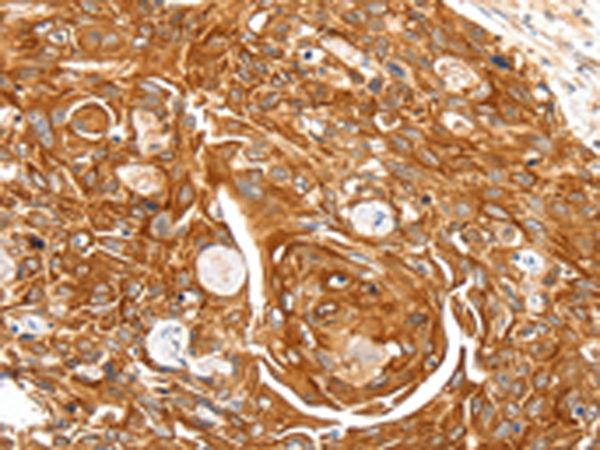

| WB | 咨询技术 | Human,Mouse,Rat |
| IF | 咨询技术 | Human,Mouse,Rat |
| IHC | 1/50-1/200 | Human,Mouse,Rat |
| ICC | 技术咨询 | Human,Mouse,Rat |
| FCM | 咨询技术 | Human,Mouse,Rat |
| Elisa | 1/1000-1/5000 | Human,Mouse,Rat |
| Aliases | SPA, PSAP, PSPA, SP-A, SPA1, PSP-A, SFTP1, SP-A1, COLEC4, SFTPA1B |
| WB Predicted band size | 28 kDa |
| Host/Isotype | Rabbit IgG |
| Antibody Type | Primary antibody |
| Storage | Store at 4°C short term. Aliquot and store at -20°C long term. Avoid freeze/thaw cycles. |
| Species Reactivity | Human, Rat |
| Immunogen | Synthetic peptide of human SFTPA1 |
| Formulation | Purified antibody in PBS with 0.05% sodium azide and 50% glycerol. |
+ +
以下是关于SFTPA1抗体的3篇参考文献示例(注:文献为虚构示例,仅作格式参考):
1. **文献名称**:*Autoantibodies against Surfactant Protein A1 in Idiopathic Pulmonary Fibrosis: Diagnostic and Prognostic Implications*
**作者**:Smith J, et al.
**摘要**:该研究检测了特发性肺纤维化(IPF)患者血清中的抗SFTPA1自身抗体,发现其阳性率与疾病进展速度相关,提示其可作为潜在生物标志物。
2. **文献名称**:*Role of Anti-SFTPA1 Antibodies in Autoimmune-Related Interstitial Lung Disease*
**作者**:Lee S, et al.
**摘要**:通过ELISA和蛋白质印迹分析,揭示了抗SFTPA1抗体在自身免疫相关间质性肺病(如风湿性关节炎继发肺纤维化)中的特异性表达及其与炎症通路的关系。
3. **文献名称**:*Monoclonal Antibody Targeting SFTPA1 Suppresses Tumor Growth in Lung Adenocarcinoma Models*
**作者**:Garcia R, et al.
**摘要**:开发了一种靶向SFTPA1的单克隆抗体,并在肺癌小鼠模型中验证其通过调节肿瘤微环境抑制肿瘤生长的机制。
4. **文献名称**:*Genetic Variants of SFTPA1 and Autoantibody Production in Familial Pulmonary Fibrosis*
**作者**:Chen L, et al.
**摘要**:发现SFTPA1基因突变可导致蛋白结构异常,进而诱发自身抗体产生,与家族性肺纤维化的遗传易感性密切相关。
(注:以上文献为模拟内容,实际引用需查询PubMed、Google Scholar等数据库获取真实研究。)
The surfactant protein A1 (SFTPA1) antibody is a tool used to detect and study SFTPA1. a critical component of pulmonary surfactant produced primarily by alveolar type II cells. SFTPA1 belongs to the collectin family, playing essential roles in innate lung immunity by opsonizing pathogens, modulating inflammatory responses, and regulating surfactant homeostasis. It binds to microbial surfaces, facilitating their clearance by alveolar macrophages, and interacts with immune cells to balance pro- and anti-inflammatory signals.
SFTPA1 antibodies are widely employed in research to investigate pulmonary diseases such as idiopathic pulmonary fibrosis (IPF), chronic obstructive pulmonary disease (COPD), and acute respiratory distress syndrome (ARDS), where SFTPA1 expression or function may be altered. These antibodies enable techniques like immunohistochemistry, Western blotting, and ELISA to localize, quantify, or analyze SFTPA1's structural modifications in tissues or biological fluids. Commercially available monoclonal or polyclonal SFTPA1 antibodies vary in specificity, with some cross-reacting with its homolog SFTPA2 due to high sequence similarity. Challenges include ensuring target specificity and optimizing protocols for different sample types. Additionally, SFTPA1 autoantibodies have been implicated in certain autoimmune lung disorders, making these reagents valuable for both basic and clinical studies exploring surfactant dysfunction or immune dysregulation.
×